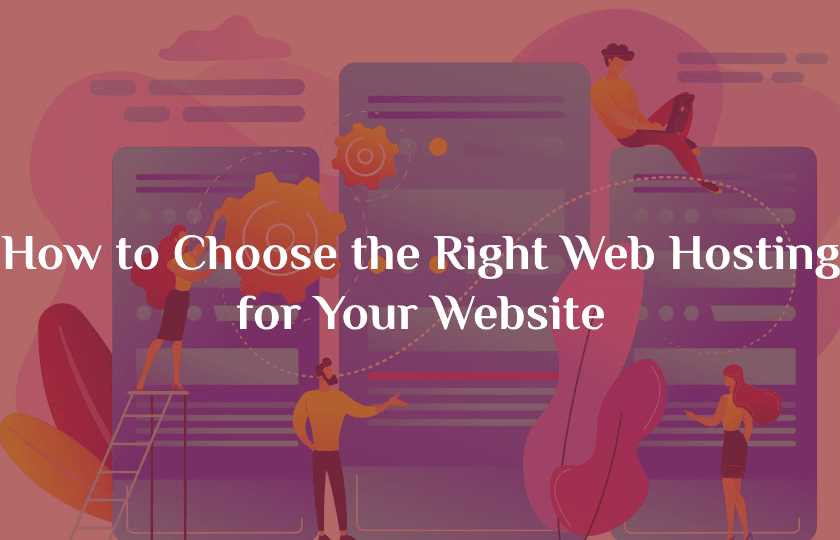Choosing the right web hosting is one of the most important decisions you’ll make for your website. Whether you’re launching a personal blog, an e-commerce store, or a corporate website, your hosting provider directly affects site speed, security, SEO, user experience, and even your ability to scale.
With hundreds of hosting options available, selecting the right one can feel overwhelming. In this guide, we’ll walk you through everything you need to know to confidently choose a web host that matches your needs — both now and in the future.
1. Understand What Web Hosting Is
Before diving into the specifics, it helps to understand what web hosting actually does.
What Is Web Hosting?
Web hosting is a service that allows you to store and serve your website files on a server connected to the internet. When a user types your domain name into their browser, the hosting server delivers your site’s content to their device.
A good host ensures your site is:
Always available (uptime)
Fast to load (performance)
Secure from threats (security)
Scalable (grows with your traffic)
2. Know the Types of Web Hosting
There’s no one-size-fits-all solution. Different hosting types serve different needs.
1. Shared Hosting
Best for: Beginners, small websites, blogs
Pros: Affordable, easy to use
Cons: Slower, shared resources with other sites
2. VPS Hosting (Virtual Private Server)
Best for: Medium-sized websites, agencies, growing businesses
Pros: More control and better performance
Cons: Slightly more expensive and technical
3. Dedicated Hosting
Best for: Large websites, high-traffic businesses, enterprises
Pros: Full control, maximum performance
Cons: High cost, requires technical expertise

4. Cloud Hosting
Best for: Sites with fluctuating traffic or rapid growth
Pros: Scalable, reliable, flexible pricing
Cons: Can be complex or costly depending on usage
5. Managed WordPress Hosting
Best for: WordPress users who want simplicity
Pros: Optimized for WordPress, automatic updates, backups
Cons: More expensive than shared hosting
Choosing the wrong type can lead to performance issues, unexpected downtime, and frustrating limitations.
3. Evaluate Hosting Based on Your Website’s Needs
Your hosting should align with your business goals and website functions.
Key Questions to Ask:
How much traffic do you expect monthly?
Will your site include dynamic content (like user logins, shopping carts)?
Are speed and performance top priorities?
Will you be uploading lots of media (videos, images)?
Do you need email hosting included?
Will your team manage the server, or do you want a managed solution?
A small blog has very different hosting needs than an international e-commerce store. Be honest about your goals and scale accordingly.
4. Consider Hosting Performance: Speed and Uptime
Speed and uptime aren’t optional—they’re critical to user experience and SEO.
What to Look For:
Uptime Guarantee: Look for 99.9% or higher.
Server Locations: Choose a host with servers near your audience.
SSD Storage: Solid-state drives are much faster than HDDs.
Built-in Caching: Helps pages load faster by storing copies.
CDN Integration: Content Delivery Networks (like Cloudflare) improve speed globally.
Use third-party tools like Pingdom, GTmetrix, or Uptime Robot to verify a host’s performance claims.
5. Don’t Overlook Customer Support
When something breaks, fast and helpful support can save your website — and your business.
What Great Support Looks Like:
24/7 live chat or phone support
Fast response times (under 15 minutes is ideal)
Knowledgeable staff (not just scripted replies)
Extensive documentation or community forums
Check user reviews to see if a hosting company actually delivers on its support promises.
6. Pay Attention to Security Features
Cyber threats are on the rise, and your host plays a big role in your site’s security defense.
Security Features to Look For:
Free SSL certificate (essential for HTTPS)
Daily or weekly backups
Malware scanning and removal
Firewall protection
DDoS attack mitigation
Two-factor authentication (2FA) for account access
A good host provides multiple layers of protection, especially if you’re handling sensitive data.
7. Check for Scalability and Growth Options
What happens when your website takes off and you suddenly get a spike in traffic? Your hosting should be able to grow with you.
Look for:
Easy upgrade paths (e.g., from shared to VPS)
Pay-as-you-go models for cloud hosting
Add-on services (storage, bandwidth, domains)
No limits on essential features like databases or email accounts
Scalability helps you avoid migrating hosts every time your needs change.

8. Compare Pricing (But Don’t Be Fooled by Cheap Deals)
While budget matters, don’t choose a host based on price alone. Cheaper hosting may mean:
Slower servers
Overloaded shared resources
Weak support
Limited features
Consider:
Introductory vs. renewal pricing (many hosts double prices after the first year)
What’s included: domain, SSL, backups, email, etc.
Refund policy and trial periods
Choose hosting that offers real value, not just a low entry price.
9. Look for a User-Friendly Control Panel
Whether you’re a beginner or experienced developer, a good control panel makes managing your website easier.
Popular Control Panels:
cPanel: Industry standard, great for beginners
Plesk: Windows-compatible alternative to cPanel
Custom dashboards (e.g., Kinsta, SiteGround): Designed for ease of use
A well-designed interface can save you hours of frustration when setting up email, SSL, databases, or managing domains.
Why You Should Avoid Using Too Many Pop-Ups on Your Website
10. Check Reviews and Reputation
Before you buy, see what real customers are saying.
Where to Look:
Trustpilot
Reddit communities (e.g., r/webhosting)
Facebook groups or LinkedIn discussions
YouTube comparison videos
WordPress or web development forums
Look for patterns in complaints or praise. Beware of fake reviews or heavily biased blog posts with affiliate links.
11. Consider Specialized Hosting If Needed
Depending on your platform or tech stack, you may benefit from niche-specific hosting.
Examples:
Managed WordPress hosting (e.g., Kinsta, WP Engine)
Node.js hosting (e.g., A2 Hosting, Heroku)
E-commerce hosting (optimized for WooCommerce, Magento, or Shopify)
Enterprise cloud hosting (AWS, Google Cloud, Azure)
Specialized hosts often come with optimized environments, better support, and platform-specific features.
12. Check Email Hosting Options
Some hosting providers include free email hosting, while others require third-party integration (e.g., Google Workspace or Microsoft 365).
Consider:
Number of email accounts included
Webmail access and email forwarding
Anti-spam and virus protection
IMAP/SMTP support for external email apps
If email is crucial for your business, make sure your hosting plan includes reliable email features or supports easy integration.
13. Ask About Backup and Restore Options
Backups can save your site from disaster — whether it’s accidental deletion, hacking, or corrupted files.
What to Look For:
Automated daily or weekly backups
One-click restore function
Ability to back up files + databases
Manual backup options before updates
Some hosts include this for free, while others charge extra.
14. Try Before You Commit
If possible, test the hosting service before making a long-term commitment.
Ways to Try It Out:
Use a free trial or money-back guarantee
Install a sample site and test speed/load time
Contact support and ask a few technical questions
This gives you a better feel for what to expect once your real website is running.
Final Thoughts:
Invest in the Right Foundation
Your hosting provider is the foundation of your online presence. Choosing the right host means faster load times, fewer technical headaches, better SEO, stronger security, and happier visitors.
Take your time. Compare options. Think beyond just price. And always choose a hosting provider that supports your business goals, technical needs, and future growth.
Because when your hosting is solid, everything else — content, design, SEO, user experience — works better.



